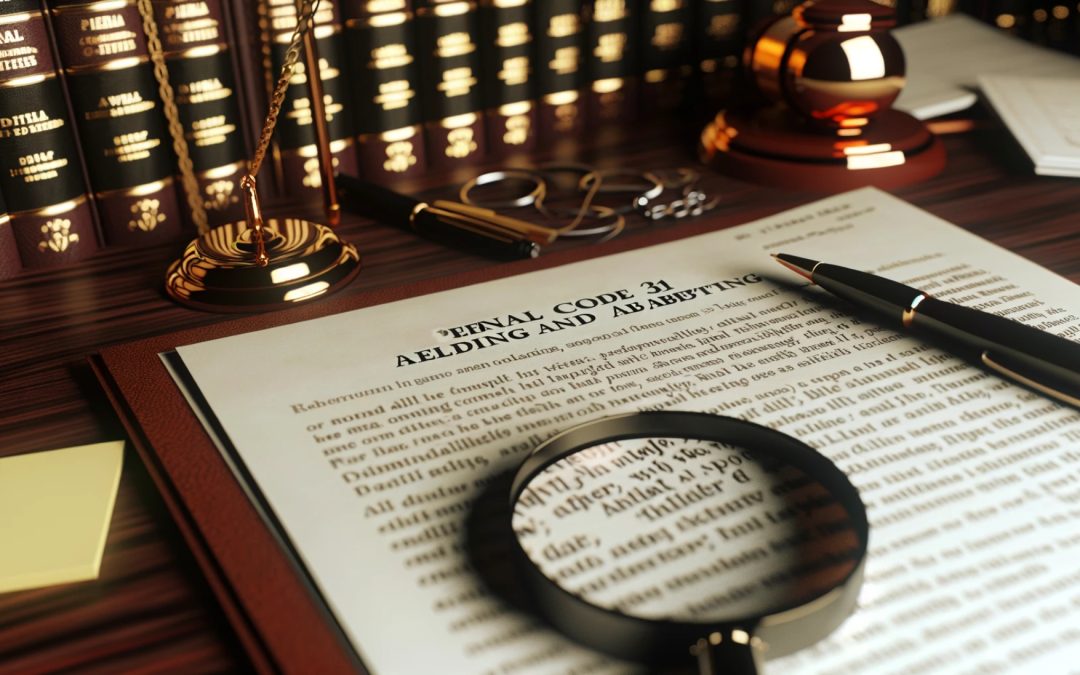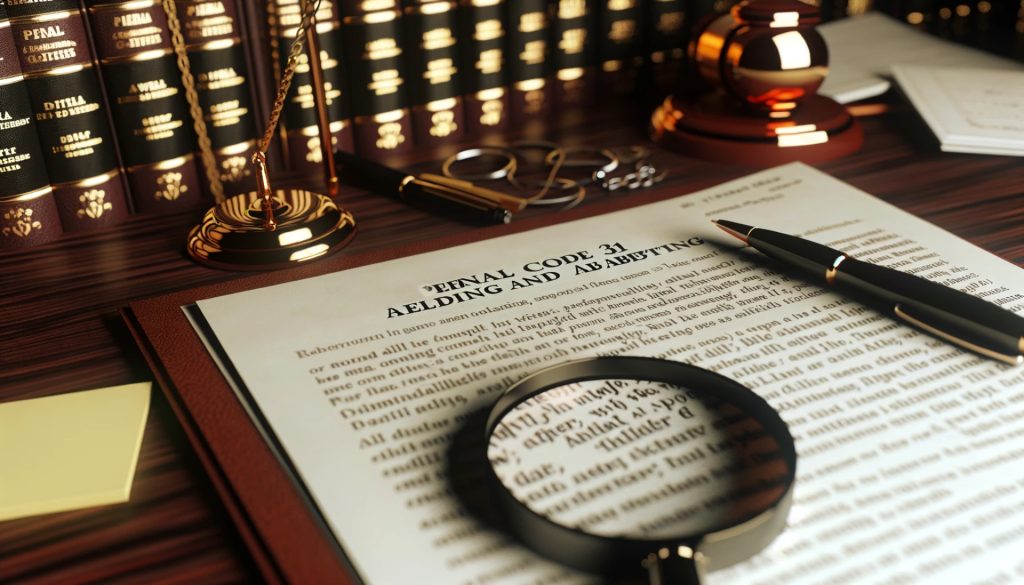Picture this scenario: you’re spending time with your acquaintances, and one of them brings up a questionable business proposition that raises suspicions in your mind. However, you dismiss these concerns.
Eventually, you discover that the venture was actually a failed fraudulent scheme, and now you find yourself confronted with charges related to assisting and supporting a criminal offense. Perplexed? You are not without companionship.
California’s Penal Code 31 encompasses a broad scope, imposing liability on individuals even if they did not personally engage in the commission of a crime.
Let’s unravel the intricate legal terrain and make it easier to comprehend!
How Does California Law Define Aiding And Abetting?
Consider the following perspective: should you willfully aid another person in carrying out an unlawful act, no matter how minor your contribution, you may potentially face charges as an accomplice under California Penal Code 31.
This encompasses a range of actions, including providing means of escape or merely offering support, also known as accessory-after-the-fact[1]. The crucial factor lies in having a clear intention and actively engaging in the process.
Legal Framework under Penal Code § 31
PC 31 does not exist in isolation but rather interfaces with other legislations, resulting in a complex legal framework. It is crucial to comprehend two fundamental ideas:
- Actus reus: also known as the physical element of the crime, pertains to the actual action committed in the commission of the offense. In order to be considered an accomplice, one must have actively contributed to the crime, even if the contribution was indirect.
- Mens rea: which refers to one’s mental state[2], entails the requirement of intent in facilitating the occurrence of a crime. Mere awareness of another person’s criminal intentions does not suffice.
Criteria for Prosecution as an Accomplice
In order to secure a conviction under PC 31, prosecutors must substantiate specific components.
- The underlying crime: Someone must have committed a specific crime (e.g., theft, assault).
- Your knowledge: Your awareness encompassed both the offense and the malevolent intentions of the perpetrator.
- Your action: Your involvement, when you contributed to the occurrence of the crime by taking action.
- Specific intent: It pertains to the deliberate intention to assist in the commission of a crime, rather than simply providing accidental assistance.
Presence at the Crime Scene
Were you simply in the incorrect location at an unfavorable moment? Merely being physically present at a crime scene does not inherently classify you as an accomplice according to Penal Code 31.
Your actions and intentions hold greater significance in determining culpability. If you were in that place against your will, completely oblivious to the crime, or actively made an effort to prevent it[3], then you are likely to possess a robust defense.
Knowledge and Intent in Aiding and Abetting a Crime
Being aware of a potential crime, also known as aiding and abetting California, is insufficient. It is essential to possess both the knowledge that it would undoubtedly take place and the intention to facilitate its occurrence, following the Penal Code 31.
Furthermore, simple acquiescence or remaining silent does not amount to aiding and abetting a crime.
What are the best defenses to a PC 31 charge?
Being confronted with PC 31 charges can appear overwhelming, but be aware that you do have legal choices. Below are a few possible defensive strategies to consider:
- Lack of Active Participation: Did you just offer ambiguous support or did you proactively provide assistance? Emphasizing the limited extent of your engagement can be significant.
- Addressing False Accusations: In cases of false accusations[4], it is crucial to present evidence and clarify one’s involvement in order to rectify any misrepresentation.
- Withdrawal from Criminal Activity: Have you made attempts to halt or disassociate yourself from the unlawful conduct upon recognizing its true nature? Displaying proactive withdrawal can bolster your legal position.
- No Legal Duty to Prevent the Crime: There is typically no legal requirement to intervene in the criminal acts of others unless you possess a specific legal responsibility, such as being a law enforcement officer.
- Post-Crime Assistance: Providing support to an individual following a crime does not classify you as an accomplice, yet it is crucial to exercise caution as the distinction can sometimes be ambiguous.
Charges for Aiding and Abetting?
In the event of being found guilty of aiding and abetting punishment under PC 31, you will be subject to identical consequences as the individual who physically carried out the crime.
These consequences may vary when it comes to charges for aiding and abetting California, ranging from monetary penalties and probation to substantial periods of incarceration, depending on the gravity of the underlying offense.
Let’s see some extra details together:
- Accomplice Liability in Serious Crimes
Imagine a scenario where you assisted an individual in stealing a candy bar, which may seem trivial. However, if you were involved in orchestrating a bank robbery, the potential repercussions become significantly more severe.
In cases of significant offenses such as murder or drug trafficking, the legal system adopts a more stringent position. Even in situations where an individual did not directly commit the act of pulling the trigger or engaging in drug dealing, the concept of the natural and probable consequences doctrine enables them to be held responsible for the foreseeable consequences resulting from their actions.
Consider it from this perspective: if you were aware that the wrongdoing could result in harm, and yet you chose to assist, it is possible that you could be perceived as bearing equal responsibility.
- The Doctrine of Natural and Probable Consequences
Consider the scenario of initiating the motion of a domino – as it topples, it subsequently triggers the fall of another, followed by yet another.
The natural and probable consequences doctrine operates in a comparable manner. If you willingly assisted an individual in carrying out a criminal act, and it resulted in additional harm that a rational person could have anticipated, you may also be legally responsible for that harm.
Accepting this concept can be challenging, but it is crucial to comprehend the extensive scope of accomplice liability.
Schedule a Consultation with Our Law Firm
Having adept legal representation is essential when facing the intricacies of PC 31 charges. Our Los Angeles criminal defense lawyers[5] comprehend the subtleties of these statutes and are wholeheartedly committed to safeguarding your rights.
Don’t hesitate to arrange a meeting at your earliest convenience to address your unique circumstances and explore the available avenues for defense. Bear in mind that seeking legal counsel promptly could potentially bolster your position!


